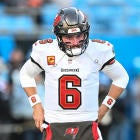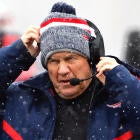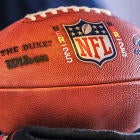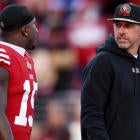After a week that involved several twists and turns, the Raiders granted Brown's request and released the receiver on Saturday.
However, the Raiders have a 16-game schedule ahead of them, and if Brown indeed is done before he ever started in Oakland, Derek Carr's receiver group will take a seismic hit two days before the club's season opener on Monday Night Football against the Broncos.
Ryan Wilson, John Breech and Sean Wagner-McGough broke down the latest development in the ongoing Brown saga in an emergency Saturday edition of the Pick Six Podcast. Listen below and be sure to subscribe wherever you get your podcasts:
So who's left at the receiver spot for the Raiders? We'll take a look at the key 2019 options below, but first let's talk about the two young guys who could be long-term options for the Raiders if everything breaks right.
Hunter Renfrow
Renfrow came in at No. 231 on my final Big Board for the 2019 NFL Draft. While he had all the makings of being a legendary "trust the tape" prospect, I just felt he was simply too small (5-10 and 184 pounds) with athleticism that wasn't of NFL caliber, as none of his explosiveness drills (40, vertical, and broad) eclipsed the 45th percentile at the receiver position.
His three-cone time placed in the 75th percentile though and showed up on the field in his illustrious career at Clemson. Renfrow was always open and caught everything. Per Pro Football Focus, Renfrow only had one drop on 50 catchable passes in the Tigers' national-title winning season last year. Despite his limited physical attributes, there was aspect of Renfrow's draft profile that was intriguing: his productive at a young age in college. He spent most of his freshman season with the Tigers as a 19-year-old and contributed immediately with 33 catches for 492 yards (14.9 yards per grab) and five touchdowns. Most successful NFL receivers were able to make an impact early in their collegiate careers, not simply when they had an age advantage over most of their competition as seniors.
While Renfrow would't average over 12 yards per catch in any of his next three seasons, he was the staple of consistency for the Tigers through the Deshaun Watson, Kelly Bryant, and Trevor Lawrence eras. In those campaigns, he averaged 51 receptions and 547 yards per year.
And the sureness of his hands is absolutely amazing because he had the smallest hands among receivers in at least the last 20 years at the combine at 7 7/8 inches. Beyond his catching specialty and subtle ability to create separation, Renfrow's best attribute comes immediately after the catch. He's uncanny making the first guy miss. While he won't away from NFL defensive backs, Renfrow will turn three-yard passes into seven-yard gains on a relatively consistent basis.
He's a perfect fit in Jon Gruden's West Coast offense, which is likely part of the reason Oakland used a fifth-round pick on him. Don't be surprised if he becomes a favorite target of Derek Carr thanks to his sharp, differing-speeds route running skills and sticky hands.
Marcell Ateman
Ateman currently resides at the No. 6 in my practice squad power rankings. I adored what I saw from him in his final season at Oklahoma State. He was a go-to target on third downs and in the red zone while occasionally flashing good downfield speed and plus ball-tracking capabilities. He came in at No. 38 prospect and No. 4 wideout in the 2018 class. While he was outproduced by James Washington, Ateman finished fifth in the nation in yards per route run (3.52) as a senior and had the sixth-highest passer rating while targeted (134.7), per PFF. Ateman wasn't a repeated separation-creator with the Cowboys and, in Oklahoma State's wide-open offense in the defensively challenged Big 12, he didn't see press often, so he's raw getting off the line against aggressive man coverage.
Was I too high on him? Probably. His combine left much to be desired as he ran 4.62 and had a three-cone and short shuttle time in the 29th and 40th percentile, respectively. But despite his average-at-best effort in Indianapolis, Ateman last year showed he can contribute in the regular season.
He made 15 catches for 154 yards with a score on just 370 snaps after getting the practice squad call up in November. His 2019 preseason was solid too with eight grabs for 101 yards. The almost 6-foot-5, 212-pound Ateman has a large catch radius and can be a respectable No. 3 or No. 4 wideout with the Raiders, if the coaches feel they need more size at the position.
Now let's take a look at the veterans who will look to replace Brown's expected production.
Tyrell Williams
Williams was the "other" big veteran receiver the Raiders acquired this offseason but did so in free agency. The 6-foot-4, 205 receiver was a deep-threat mainstay with the Chargers since his second NFL season after making the team as an undrafted free agent in 2015 out of Western Oregon.
While he didn't receive a combine invite, Williams recorded a 39.5-inch vertical, a 127-inch broad jump, and a blistering 4.42 time in the 40 at his pro day. Since 2016, Williams has been one of the NFL's best low-volume, high-efficiency deep threats. He's averaged 15.9 yards per reception on 153 catches in those three campaigns and has scored 12 touchdowns. His yards-per-target figure of 9.6 ranks fourth in the league among wideouts who've seen at least 250 targets in that span (he's seen 253).
Williams wins with above-average ball-tracking skills, decent ability to beat press at the line, and most importantly, deceptively fast long speed. If Brown never plays for the Raiders, Williams will be a No. 1 receiver for the first time in his career. Even in college he was outproduced by a teammate in his final season.
J.J. Nelson
Nelson entered the league as fifth-round pick of the Cardinals in 2014, and Arizona took a chance on a 5-10, 156-pound wideout from UAB because of his elite speed. He ran 4.28 at the combine that year.
On those dynamic, Bruce Arians and Carson Palmer teams, Nelson really flashed but didn't make many catches. As a rookie he averaged an absurd 27.2 yards per grab on 11 catches with two touchdowns. He then started to look the part of a niche downfield burner the following two seasons by averaging 31.5 receptions, 538 yards -- 17 yards per snag -- in 2016 and 2017.
He regressed in a big way in 2018 on Arizona's abysmal offense, as he caught just seven balls for 64 yards. When Gruden dials up a deep shot, and a safety is rolling over the top of Williams, look for Derek Carr to check Nelson down the other side of the field.
Ryan Grant
Another 2014 draftee, Grant came into the league as a member of the Redskins, and Washington used a fifth-round selection on him after a solid career at Tulane. While he ran slow at the combine (4.64), he had a scintillating 6.68 three-cone time (88th percentile) yet took a while to acclimate himself to the offenses in the nation's capital.
In his second season, as a stand-in slot receiver, Grant reeled in 28 passes for 268 yards - 11.7 yards per -- with two scores. After being essentially non-existent in 2016, he had a respectable 2017 with a 43-573-4 line. Despite repeated mentions of how he was a Jay Gruden favorite, Grant hit free agency and signed with the Colts in 2018. He averaged just 9.5 yards per grab on 34 receptions last season with Andrew Luck under center.
At this point in his career, the Raiders know what they're getting from Grant. He's a quick, chain-moving option who doesn't have any standout traits that would be the impetus to him having a big year.
Dwayne Harris
Harris has become a fine return specialist, but has just seven catches for 53 yards in his last two NFL seasons, and he's 32.


















